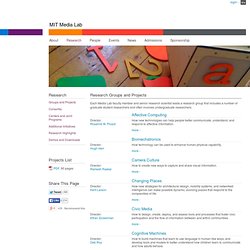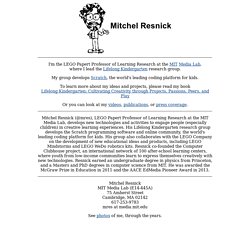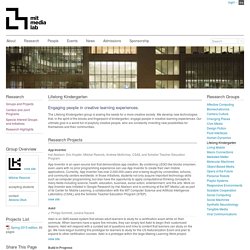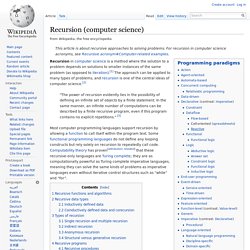

Bibliografia em inglês sobre Internet e cultura digital. Bibliografia de cibercultura: Inteligência coletiva. Bibliografia de cibercultura: Negócios e consumo online. Bibliografia de cibercultura: Redes sociais online. Bibliografia de cibercultura: Cibercultura. Multimedia - From Wagner to Virtual Reality. Research Groups and Projects. Each Media Lab faculty member and senior research scientist leads a research group that includes a number of graduate student researchers and often involves undergraduate researchers.

How new technologies can help people better communicate, understand, and respond to affective information. How technology can be used to enhance human physical capability. How to create new ways to capture and share visual information. How new strategies for architectural design, mobility systems, and networked intelligence can make possible dynamic, evolving places that respond to the complexities of life. How to design, create, deploy, and assess tools and processes that foster civic participation and the flow of information between and within communities. Atopos. Chel Resnick. I'm the LEGO Papert Professor of Learning Research at the MIT Media Lab, where I lead the Lifelong Kindergarten research group.

My group develops Scratch, the world's leading coding platform for kids. To learn more about my ideas and projects, please read my book Lifelong Kindergarten: Cultivating Creativity through Projects, Passions, Peers, and Play Or you can look at my videos, publications, or press coverage. Mitchel Resnick (@mres), LEGO Papert Professor of Learning Research at the MIT Media Lab, develops new technologies and activities to engage people (especially children) in creative learning experiences. His Lifelong Kindergarten research group develops the Scratch programming software and online community, the world's leading coding platform for kids. Lifelong Kindergarten. Hal Abelson, Eric Klopfer, Mitchel Resnick, Andrew McKinney, CSAIL and Scheller Teacher Education Program App Inventor is an open-source tool that democratizes app creation.

By combining LEGO-like blocks onscreen, even users with no prior programming experience can use App Inventor to create their own mobile applications. Currently, App Inventor has over 2,000,000 users and is being taught by universities, schools, and community centers worldwide. In those initiatives, students not only acquire important technology skills such as computer programming, but also have the opportunity to apply computational thinking concepts to many fields including science, health, education, business, social action, entertainment, and the arts. Escola de Redes - A escola é a rede. Bibliografia de cibercultura: Cibercultura.
Hypertext and Hypermedia: An Overview. Academic ADL Colab. Games Learning Society. Recursion (computer science) Recursion in computer science is a method where the solution to a problem depends on solutions to smaller instances of the same problem (as opposed to iteration).[1] The approach can be applied to many types of problems, and recursion is one of the central ideas of computer science.[2] "The power of recursion evidently lies in the possibility of defining an infinite set of objects by a finite statement.

In the same manner, an infinite number of computations can be described by a finite recursive program, even if this program contains no explicit repetitions. " [3] A common computer programming tactic is to divide a problem into sub-problems of the same type as the original, solve those sub-problems, and combine the results. Many computer programs must process or generate an arbitrarily large quantity of data. Recursion is one technique for representing data whose exact size the programmer does not know: the programmer can specify this data with a self-referential definition. If. Ieml.